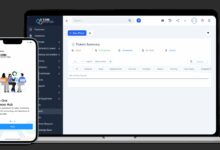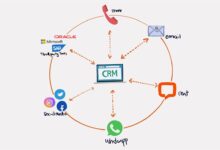Cloud based crm systems examples: Top 7 Cloud Based CRM Systems Examples: Ultimate Guide 2024
In today’s fast-paced digital world, businesses need smarter ways to manage customer relationships. Enter cloud based CRM systems examples—powerful, flexible, and scalable tools that are revolutionizing how companies interact with clients. Let’s explore the best options available today.
What Are Cloud Based CRM Systems? A Quick Overview

Cloud based CRM systems are software platforms hosted on remote servers and accessed via the internet. Unlike traditional on-premise CRM solutions, they eliminate the need for local installations, reduce IT overhead, and offer real-time data access from anywhere in the world. These systems are especially valuable for businesses aiming to scale efficiently.
How Cloud CRM Differs from On-Premise CRM
The fundamental difference lies in deployment. On-premise CRM requires businesses to install software on local servers, manage updates manually, and maintain hardware. In contrast, cloud based CRM systems examples are hosted by third-party providers, who handle maintenance, security, and upgrades automatically.
- Deployment: Cloud CRM is web-based; on-premise is server-based.
- Cost: Cloud CRM typically uses a subscription model; on-premise involves high upfront costs.
- Maintenance: Cloud CRM is managed by the vendor; on-premise requires in-house IT teams.
“The shift to cloud CRM is not just technological—it’s strategic. It enables agility, faster decision-making, and deeper customer insights.” — Gartner Research, 2023
Key Benefits of Using Cloud Based CRM Systems
Organizations are rapidly adopting cloud CRM due to its compelling advantages. These systems are not just about storing contact information—they’re about transforming customer engagement.
- Scalability: Easily adjust user licenses and features as your business grows.
- Accessibility: Access data from any device with an internet connection—ideal for remote teams.
- Automatic Updates: Vendors roll out new features and security patches without downtime.
- Integration: Seamlessly connect with email, marketing automation, ERP, and e-commerce platforms.
- Cost Efficiency: Pay-as-you-go models reduce capital expenditure.
According to Salesforce’s State of Sales Report, 87% of high-performing sales teams use cloud-based CRM tools, citing improved visibility and collaboration as top benefits.
Top 7 Cloud Based CRM Systems Examples in 2024
With dozens of CRM platforms on the market, choosing the right one can be overwhelming. Below, we break down the top seven cloud based CRM systems examples based on functionality, user experience, scalability, and integration capabilities.
cloud based crm systems examples – Cloud based crm systems examples menjadi aspek penting yang dibahas di sini.
1. Salesforce Sales Cloud
Salesforce remains the undisputed leader in the CRM space. Its Sales Cloud is a fully cloud-native platform offering robust sales automation, lead management, forecasting, and analytics.
- Key Features: AI-powered Einstein Analytics, workflow automation, mobile app, AppExchange ecosystem.
- Best For: Mid to large enterprises needing deep customization.
- Pricing: Starts at $25/user/month (Essentials), up to $300/user/month (Unlimited).
Salesforce integrates with over 4,000 apps via its AppExchange, making it one of the most extensible platforms. Learn more at Salesforce Sales Cloud Overview.
2. HubSpot CRM
HubSpot CRM stands out for its user-friendly interface and free tier that includes core CRM functionalities. It’s ideal for startups and small businesses looking to grow without breaking the bank.
- Key Features: Contact and deal tracking, email tracking, meeting scheduling, live chat, marketing automation.
- Best For: Small to medium businesses (SMBs) and marketing teams.
- Pricing: Free core CRM; paid tiers start at $45/month (Starter).
HubSpot’s ecosystem allows seamless integration between sales, marketing, service, and CMS hubs. Explore it at HubSpot CRM.
3. Zoho CRM
Zoho CRM is a powerful, affordable solution that combines automation, AI, and multichannel communication tools. It’s particularly popular among SMBs and global teams.
- Key Features: Zia AI assistant, sales forecasting, workflow rules, social CRM, telephony integration.
- Best For: Businesses seeking affordability with enterprise-grade features.
- Pricing: Starts at $14/user/month (Standard), up to $52/user/month (Enterprise).
Zoho offers a 15-day free trial and supports over 30 languages. Visit Zoho CRM for more details.
cloud based crm systems examples – Cloud based crm systems examples menjadi aspek penting yang dibahas di sini.
4. Microsoft Dynamics 365 Sales
For organizations already using Microsoft 365, Dynamics 365 Sales offers deep integration with Outlook, Teams, and Power BI. It’s a smart choice for enterprises invested in the Microsoft ecosystem.
- Key Features: AI-driven insights, relationship analytics, embedded Office tools, custom dashboards.
- Best For: Enterprises using Microsoft 365 and Azure.
- Pricing: $65/user/month (Professional), $225/user/month (Enterprise).
Dynamics 365 is highly customizable and supports complex sales processes. Learn more at Microsoft Dynamics 365 Sales.
5. Pipedrive
Pipedrive is built for sales-focused teams who want a visual, pipeline-driven CRM. Its drag-and-drop interface makes it easy to manage deals and track progress.
- Key Features: Visual sales pipeline, activity reminders, email integration, reporting tools.
- Best For: Sales teams prioritizing pipeline management.
- Pricing: Starts at $14.90/user/month (Essential), up to $99/user/month (Advanced).
Pipedrive excels in simplicity and usability. It’s perfect for small sales teams that want to avoid clutter. See it in action at Pipedrive CRM.
6. Freshsales (by Freshworks)
Freshsales combines CRM with AI-powered engagement tools. It offers built-in phone, email, and chat capabilities, making it a unified platform for customer interaction.
- Key Features: Freddy AI, gamified sales performance, real-time engagement, lead scoring.
- Best For: Sales teams wanting all-in-one communication tools.
- Pricing: Free for up to 3 users; paid plans start at $15/user/month.
Freshsales is known for its intuitive design and fast setup. Explore it at Freshsales CRM.
cloud based crm systems examples – Cloud based crm systems examples menjadi aspek penting yang dibahas di sini.
7. Insightly
Insightly is a CRM and project management hybrid, ideal for businesses that manage customer relationships alongside complex projects.
- Key Features: Project tracking, workflow automation, customer journey mapping, API access.
- Best For: Professional services, consulting, and project-based businesses.
- Pricing: Starts at $29/user/month (Pro), up to $75/user/month (Enterprise).
Insightly bridges the gap between CRM and project management. Learn more at Insightly CRM.
How to Choose the Right Cloud Based CRM System for Your Business
Selecting the best cloud based CRM systems examples isn’t just about features—it’s about alignment with your business goals, team size, industry, and budget. Here’s a structured approach to help you decide.
Assess Your Business Needs and Goals
Start by identifying what you want to achieve with your CRM. Are you looking to improve lead conversion? Enhance customer service? Automate marketing campaigns?
- Map out your customer journey.
- Identify pain points in your current process.
- Define key performance indicators (KPIs) like sales cycle length or customer retention rate.
For example, a real estate agency might prioritize lead tracking and follow-up automation, while a SaaS company may need robust integration with billing and support tools.
Consider Scalability and Integration Capabilities
Your CRM should grow with your business. Evaluate whether the platform can handle increased users, data volume, and advanced features over time.
cloud based crm systems examples – Cloud based crm systems examples menjadi aspek penting yang dibahas di sini.
- Check API availability for custom integrations.
- Ensure compatibility with existing tools (e.g., email, calendar, ERP, e-commerce).
- Look for pre-built connectors (Zapier, Make, etc.) to save development time.
For instance, Salesforce and Zoho offer extensive APIs and integration marketplaces, making them future-proof choices.
Evaluate User Experience and Training Requirements
A powerful CRM is useless if your team won’t use it. Prioritize platforms with intuitive interfaces and low learning curves.
- Request a free trial or demo.
- Involve end-users in the selection process.
- Check for available training resources (tutorials, webinars, support).
HubSpot and Pipedrive are known for their ease of use, while Salesforce may require more training but offers deeper functionality.
Key Features to Look for in Cloud Based CRM Systems Examples
Not all CRMs are created equal. To get the most value, focus on platforms that offer these essential features.
Contact and Lead Management
The foundation of any CRM is its ability to store, organize, and track customer data. Look for systems that allow you to segment contacts, track interactions, and automate lead assignment.
- Custom fields and tags for personalization.
- Duplicate detection and data deduplication tools.
- Lead scoring and qualification workflows.
For example, Zoho CRM’s lead scoring feature uses behavior and engagement data to prioritize hot leads.
cloud based crm systems examples – Cloud based crm systems examples menjadi aspek penting yang dibahas di sini.
Sales Automation and Workflow Tools
Automation reduces manual tasks like data entry, follow-up emails, and task reminders. This increases productivity and ensures consistency.
- Email automation and templates.
- Task and activity reminders.
- Approval workflows and deal stage transitions.
Pipedrive’s automation engine allows users to set triggers based on deal movement, ensuring no opportunity slips through the cracks.
Analytics, Reporting, and Forecasting
Data-driven decisions are critical. A good CRM should provide real-time dashboards, customizable reports, and predictive forecasting.
- Sales pipeline reports.
- Conversion rate analysis.
- Revenue forecasting with AI insights.
Salesforce Einstein Analytics uses machine learning to predict deal closures and recommend next steps, giving sales teams a competitive edge.
Implementation Best Practices for Cloud Based CRM Systems
Even the best CRM can fail without proper implementation. Follow these best practices to ensure a smooth rollout.
Plan Your Data Migration Strategy
Moving data from spreadsheets or legacy systems requires careful planning. Poor data quality can undermine your entire CRM investment.
cloud based crm systems examples – Cloud based crm systems examples menjadi aspek penting yang dibahas di sini.
- Clean and standardize data before import (remove duplicates, fill missing fields).
- Use CSV import tools or professional migration services.
- Test data accuracy in a sandbox environment first.
Many vendors, like HubSpot and Salesforce, offer free data migration tools for small datasets.
Train Your Team Effectively
User adoption is the biggest challenge in CRM implementation. Invest in comprehensive training tailored to different roles (sales, marketing, support).
- Conduct hands-on workshops.
- Create internal documentation and video tutorials.
- Appoint CRM champions within teams to drive engagement.
According to Nucleus Research, companies that provide CRM training see 150% higher ROI than those that don’t.
Monitor Usage and Optimize Over Time
After launch, continuously monitor usage metrics and gather user feedback.
- Track login frequency, data entry completeness, and feature adoption.
- Use built-in analytics to identify bottlenecks.
- Iterate on workflows and permissions based on real-world use.
Regular optimization ensures your CRM evolves with your business needs.
Security and Compliance in Cloud Based CRM Systems
Storing sensitive customer data in the cloud raises valid concerns about security and compliance. However, reputable cloud CRM providers often offer better protection than on-premise systems.
cloud based crm systems examples – Cloud based crm systems examples menjadi aspek penting yang dibahas di sini.
Data Encryption and Access Controls
Top cloud based CRM systems examples use end-to-end encryption for data at rest and in transit. They also provide role-based access control (RBAC) to limit who can view or edit information.
- Look for AES-256 encryption standards.
- Ensure multi-factor authentication (MFA) is available.
- Check audit logs for tracking user activity.
Salesforce, for example, complies with ISO 27001, SOC 1/2/3, and GDPR standards.
Compliance with Industry Regulations
Depending on your industry, you may need to comply with regulations like GDPR (Europe), CCPA (California), HIPAA (healthcare), or PCI DSS (payment processing).
- Verify that your CRM vendor offers compliance certifications.
- Ensure data residency options (e.g., storing EU data in EU servers).
- Use consent management tools for marketing communications.
HubSpot, for instance, provides built-in GDPR tools like consent checkboxes and data export functions.
Vendor Reliability and Uptime Guarantees
Downtime can disrupt sales and customer service. Choose vendors with strong service level agreements (SLAs) and proven reliability.
- Look for 99.5%+ uptime guarantees.
- Check if they offer disaster recovery and backup solutions.
- Review their incident response history.
Most leading providers publish their uptime status on public dashboards—e.g., Salesforce Trust.
cloud based crm systems examples – Cloud based crm systems examples menjadi aspek penting yang dibahas di sini.
Future Trends in Cloud Based CRM Systems
The CRM landscape is evolving rapidly, driven by AI, automation, and customer expectations. Staying ahead of trends ensures your business remains competitive.
AI and Predictive Analytics
Artificial intelligence is no longer a luxury—it’s a necessity. Modern CRMs use AI to predict customer behavior, recommend actions, and automate responses.
- Salesforce Einstein predicts deal closure likelihood.
- Zia by Zoho suggests optimal follow-up times.
- HubSpot uses AI to personalize email content.
By 2025, Gartner predicts that 80% of CRM interactions will involve AI technologies.
Hyper-Personalization and Customer Journey Mapping
Customers expect personalized experiences. Advanced CRMs now map the entire customer journey across touchpoints—email, social media, chat, and phone.
- Track interactions across channels.
- Use behavioral data to tailor communications.
- Create dynamic customer profiles.
Insightly and Salesforce offer journey mapping tools that visualize customer paths and identify drop-off points.
Integration with Emerging Technologies
CRMs are becoming central hubs that integrate with IoT, voice assistants, and blockchain for secure transactions.
cloud based crm systems examples – Cloud based crm systems examples menjadi aspek penting yang dibahas di sini.
- IoT data from smart devices can trigger service tickets.
- Voice CRM allows hands-free data entry via Alexa or Google Assistant.
- Blockchain ensures tamper-proof customer records.
Microsoft Dynamics 365 already supports IoT integration for predictive maintenance in manufacturing.
Real-World Use Cases of Cloud Based CRM Systems Examples
Understanding how real businesses use CRM can inspire your own strategy. Here are three diverse examples.
Startup Scaling with HubSpot CRM
A SaaS startup with 10 employees used HubSpot’s free CRM to manage leads, track emails, and automate follow-ups. Within six months, they increased lead conversion by 40% and reduced manual work by 60%.
- Used workflows to assign leads based on geography.
- Integrated with Mailchimp for nurturing campaigns.
- Leveraged HubSpot’s reporting to refine outreach strategies.
Enterprise Sales Transformation with Salesforce
A global pharmaceutical company with 5,000+ sales reps deployed Salesforce Sales Cloud to standardize processes across regions. They achieved a 25% reduction in sales cycle length and improved forecast accuracy by 30%.
- Customized dashboards for regional managers.
- Integrated with SAP for order management.
- Used Einstein Analytics for predictive lead scoring.
Service-Based Business Growth with Freshsales
A digital marketing agency adopted Freshsales to manage client projects and communications. With built-in calling and email tracking, they improved response times and client satisfaction scores.
- Used Freddy AI to prioritize high-intent leads.
- Tracked client interactions across calls, emails, and meetings.
- Automated invoice reminders and contract renewals.
What are cloud based CRM systems examples?
cloud based crm systems examples – Cloud based crm systems examples menjadi aspek penting yang dibahas di sini.
Cloud based CRM systems examples include platforms like Salesforce, HubSpot CRM, Zoho CRM, Microsoft Dynamics 365, Pipedrive, Freshsales, and Insightly. These are web-based customer relationship management tools that help businesses manage contacts, sales, marketing, and customer service from anywhere.
What is the best cloud based CRM for small businesses?
HubSpot CRM and Zoho CRM are often considered the best cloud based CRM systems examples for small businesses due to their affordability, ease of use, and robust free tiers. Pipedrive is also popular for sales-focused startups.
Are cloud CRM systems secure?
Yes, reputable cloud based CRM systems examples use advanced security measures like data encryption, multi-factor authentication, and compliance with regulations like GDPR and HIPAA. They often provide better security than on-premise systems due to dedicated security teams and regular updates.
How much do cloud CRM systems cost?
cloud based crm systems examples – Cloud based crm systems examples menjadi aspek penting yang dibahas di sini.
Prices vary widely. Free options like HubSpot CRM exist, while enterprise solutions like Salesforce can cost over $300 per user per month. Most systems offer tiered pricing based on features and user count, starting from $10–$50/user/month for basic plans.
Can I integrate a cloud CRM with other business tools?
Absolutely. Most cloud based CRM systems examples offer integrations with email, calendars, marketing automation, ERP, e-commerce platforms, and more. Many support APIs and connectors via Zapier or native integrations.
Choosing the right cloud based CRM systems examples can transform how your business manages customer relationships. From Salesforce’s enterprise power to HubSpot’s simplicity, each platform offers unique strengths. The key is aligning your choice with your business size, goals, and technical needs. With proper implementation, training, and ongoing optimization, a cloud CRM becomes more than software—it becomes a strategic asset for growth, efficiency, and customer satisfaction. As AI, automation, and integration continue to evolve, the future of CRM is not just in the cloud, but in intelligence, personalization, and seamless connectivity.
Recommended for you 👇
Further Reading:




